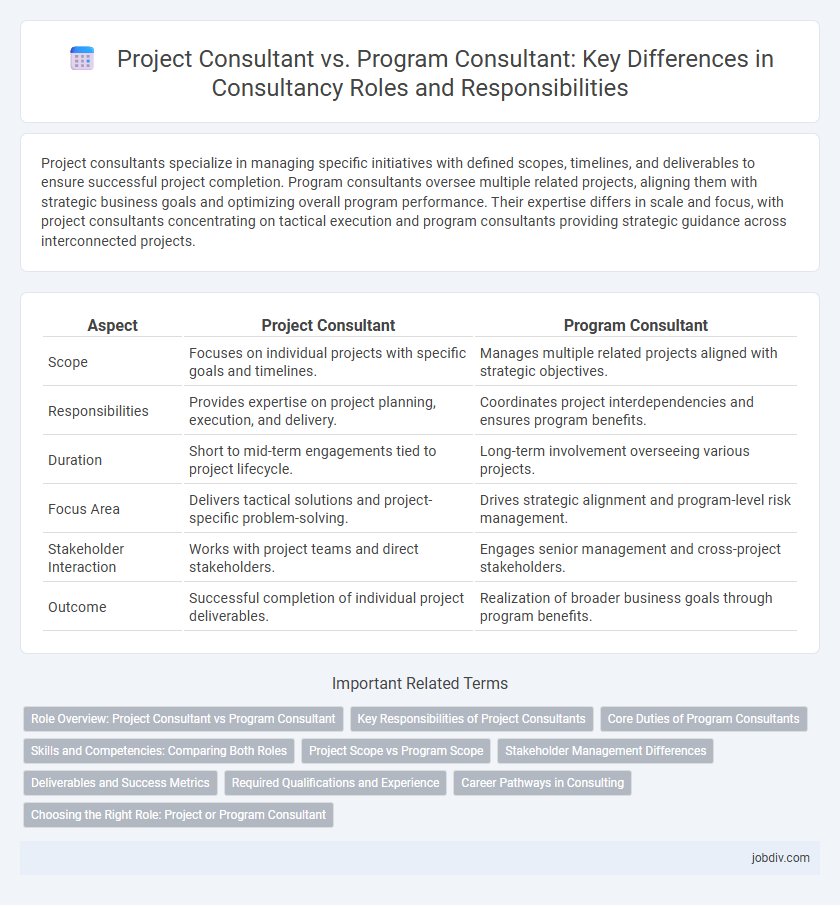Project consultants specialize in managing specific initiatives with defined scopes, timelines, and deliverables to ensure successful project completion. Program consultants oversee multiple related projects, aligning them with strategic business goals and optimizing overall program performance. Their expertise differs in scale and focus, with project consultants concentrating on tactical execution and program consultants providing strategic guidance across interconnected projects.
Table of Comparison
| Aspect | Project Consultant | Program Consultant |
|---|---|---|
| Scope | Focuses on individual projects with specific goals and timelines. | Manages multiple related projects aligned with strategic objectives. |
| Responsibilities | Provides expertise on project planning, execution, and delivery. | Coordinates project interdependencies and ensures program benefits. |
| Duration | Short to mid-term engagements tied to project lifecycle. | Long-term involvement overseeing various projects. |
| Focus Area | Delivers tactical solutions and project-specific problem-solving. | Drives strategic alignment and program-level risk management. |
| Stakeholder Interaction | Works with project teams and direct stakeholders. | Engages senior management and cross-project stakeholders. |
| Outcome | Successful completion of individual project deliverables. | Realization of broader business goals through program benefits. |
Role Overview: Project Consultant vs Program Consultant
Project Consultants focus on delivering specific project objectives by managing scope, timelines, resources, and stakeholder communication to ensure successful execution within defined parameters. Program Consultants oversee multiple related projects, aligning them with strategic business goals, managing interdependencies, and optimizing resource allocation across the program to maximize overall value. Their roles differ in scope, with Project Consultants targeting individual deliverables and Program Consultants driving broader organizational outcomes through coordinated project management.
Key Responsibilities of Project Consultants
Project Consultants primarily focus on managing specific projects by defining scope, timelines, and deliverables while ensuring alignment with client objectives. They conduct risk assessments, allocate resources efficiently, and maintain clear communication among stakeholders to ensure project milestones are met. Their key responsibility lies in driving project execution, monitoring progress, and delivering tangible results within budget and time constraints.
Core Duties of Program Consultants
Program consultants primarily oversee the coordination and alignment of multiple related projects to achieve strategic business objectives, ensuring resource optimization and risk management across the program. They facilitate stakeholder communication, track overall program progress, and provide governance frameworks to maintain consistency and quality. Their core duties include strategic planning, performance monitoring, and integrating project outcomes to drive sustained organizational value.
Skills and Competencies: Comparing Both Roles
Project Consultants excel in specialized skills such as project planning, risk management, and resource allocation, ensuring tactical execution and timely delivery. Program Consultants possess advanced competencies in strategic alignment, stakeholder communication, and cross-project integration, driving long-term benefits across multiple projects. Both roles require strong problem-solving abilities, but Program Consultants emphasize leadership and governance to oversee complex program objectives.
Project Scope vs Program Scope
Project Consultants concentrate on a defined project scope with specific deliverables, timelines, and resources aimed at achieving particular objectives within the project boundaries. In contrast, Program Consultants manage a broader program scope that encompasses multiple related projects, aligning them strategically to achieve overarching business goals and benefits. Effective scope management by Project Consultants ensures successful project completion, while Program Consultants focus on coordinating interdependencies and long-term value across projects.
Stakeholder Management Differences
Project Consultants focus on managing stakeholders within the scope of a single project, ensuring alignment with specific project goals, timelines, and deliverables. Program Consultants oversee multiple related projects, coordinating and communicating with a broader range of stakeholders to align objectives across the entire program. The complexity and scale of stakeholder engagement increase significantly in program consultancy, requiring strategic relationship management and prioritization across projects.
Deliverables and Success Metrics
Project consultants deliver specific, time-bound outputs aligned with defined project goals, emphasizing measurable deliverables such as reports, implementations, or product launches. Program consultants oversee a portfolio of related projects, focusing on strategic alignment and broader success metrics like overall program impact, resource optimization, and long-term value creation. Both roles require tracking key performance indicators (KPIs), but project consultants prioritize short-term milestones while program consultants measure cumulative benefits across multiple initiatives.
Required Qualifications and Experience
Project Consultants typically require specialized expertise in project management methodologies such as PMP or PRINCE2, with 3-5 years of experience managing individual projects within scope, time, and budget constraints. Program Consultants demand a broader skill set, including strategic planning, stakeholder management, and risk mitigation, with 5-7 years of experience coordinating multiple related projects to achieve overarching business objectives. Both roles benefit from strong analytical skills, effective communication, and a background in industries relevant to the consultancy engagement.
Career Pathways in Consulting
Project Consultants specialize in managing individual projects, focusing on scope, timelines, and deliverables, which builds expertise in specific industries or functions. Program Consultants oversee multiple related projects, aligning them with strategic business goals, thus developing skills in leadership, coordination, and long-term planning. Career pathways in consulting often start with project-based roles, advancing to program consulting positions that require broader organizational impact and stakeholder management.
Choosing the Right Role: Project or Program Consultant
Selecting between a Project Consultant and a Program Consultant depends on the scope and objectives of the engagement. Project Consultants specialize in delivering specific, time-bound project outcomes with defined deliverables, while Program Consultants oversee multiple related projects to achieve broader strategic goals. Understanding the complexity and scale of your needs ensures alignment with the consultant's expertise for optimal results.
Project Consultant vs Program Consultant Infographic

 jobdiv.com
jobdiv.com